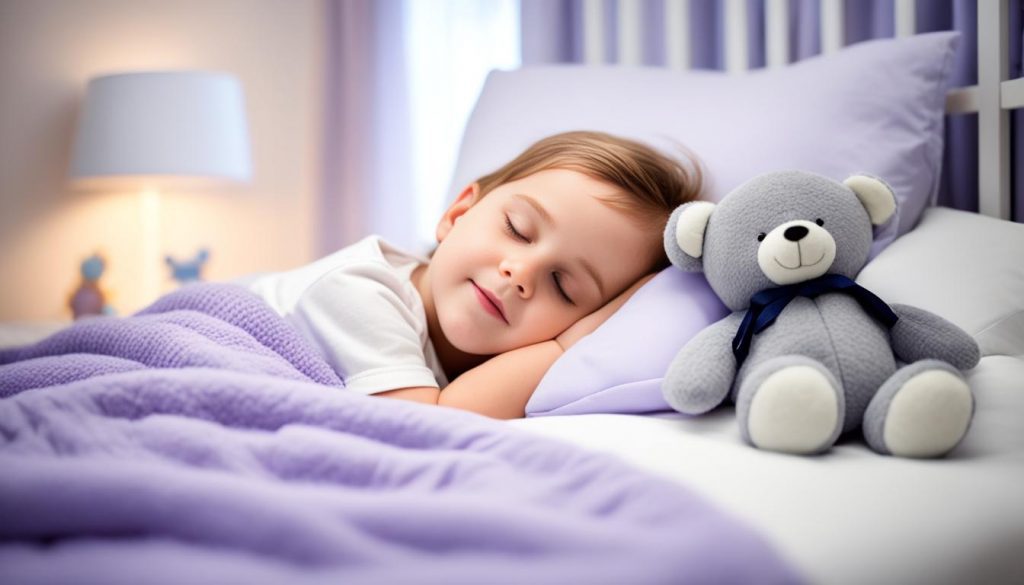As parents, we understand the importance of sleep for our children’s well-being. Sleep is not just a time of rest; it is a crucial factor in their mental and physical development. Adequate sleep is essential for growth, mood regulation, attention, and learning. However, many children struggle with sleep-related issues, which can affect their overall health and daily functioning. To help your child get the rest they need, it is important to be aware of their sleep needs and implement age-appropriate routines and sleep hygiene practices.
Key Takeaways:
- Child sleep is crucial for their mental and physical health
- Lack of sleep can lead to various issues
- Understanding sleep needs and implementing sleep hygiene can help
- Consistent routines and age-appropriate practices are important
- Parents play a vital role in ensuring their child’s restorative rest
Importance of Sleep in Children
Sleep plays a crucial role in the development of young minds. It impacts alertness, attention, cognitive performance, mood, vocabulary acquisition, and learning and memory. Napping is important for memory consolidation and motor skill development in toddlers. Lack of sleep can affect a child’s behavior, attention, and performance in school. There is also evidence linking poor sleep in childhood to future cardiovascular risks and mental health problems.
Effects of Sleep on Cognitive Function
Adequate sleep is essential for optimal cognitive function in children. Research has shown that children who get enough sleep perform better in tasks that require attention, memory, and problem-solving skills. During sleep, the brain processes and consolidates information, enhancing learning and memory. Conversely, sleep deprivation can impair cognitive performance, leading to difficulties in focusing, reasoning, and learning new information.
The Impact of Sleep on Behavior and Mood
Insufficient sleep can significantly impact a child’s behavior and mood. Sleep-deprived children may exhibit increased irritability, hyperactivity, impulsivity, and emotional instability. They may have difficulty regulating their emotions, leading to tantrums and emotional outbursts. Furthermore, inadequate sleep can contribute to symptoms of anxiety and depression in children.
The Role of Sleep in Physical Health
Quality sleep is vital for a child’s physical health and growth. During sleep, the body releases growth hormone, which is crucial for the development and repair of tissues, bones, and muscles. Inadequate sleep can disrupt the production of growth hormone, leading to stunted growth and development. Moreover, insufficient sleep has been linked to an increased risk of obesity in children. Hormonal imbalances caused by lack of sleep can affect appetite regulation and lead to unhealthy eating habits.
Toddler Sleep Training and Routine
Establishing a consistent bedtime routine and sleep training can help improve children’s sleep patterns and promote healthy sleep habits. Implementing a structured routine, including activities such as reading a book, taking a warm bath, or practicing relaxation techniques, signals to the child that it’s time to wind down and prepare for sleep. Consistency is key in reinforcing the sleep routine and establishing a regular sleep-wake schedule.
Creating a Sleep-Conducive Environment
A sleep-conducive environment is essential for optimal sleep quality. It should be quiet, dark, and at a comfortable temperature. Using blackout curtains, white noise machines, and comfortable bedding can help create a soothing sleep environment. It is also crucial to limit screen time before bedtime, as exposure to blue light from screens can disrupt the sleep-wake cycle and inhibit the production of melatonin, a hormone that promotes sleep.
Recommended Sleep Duration for Children
The American Academy of Sleep Medicine provides recommendations for appropriate sleep duration based on age:
| Age Group | Recommended Sleep Duration |
|---|---|
| Infants (4-12 months) | 12-16 hours |
| Toddlers (1-2 years) | 11-14 hours |
| Preschoolers (3-5 years) | 10-13 hours |
| School-age children (6-12 years) | 9-12 hours |
| Adolescents (13-18 years) | 8-10 hours |
It’s important to note that individual sleep needs may vary, and parents should observe their child’s behavior and adjust the sleep schedule accordingly.
Sleep Needs by Age Group
Sleep plays a vital role in the growth and development of children, and their sleep needs change as they get older. According to the American Academy of Pediatrics, approximately a quarter of children under the age of 5 do not get enough sleep. It is crucial to establish healthy sleep habits from an early age to promote proper sleep hygiene and ensure children get the rest they need.
Infants (0-12 months)
During the first year of life, infants require a significant amount of sleep to support their rapid development. Newborns can sleep up to 16-17 hours a day, with sleep durations gradually decreasing as they grow. Establishing a consistent sleep schedule for infants and following a bedtime routine can help them develop good sleep habits. Creating a sleep-conducive environment, with a quiet and comfortable sleep space, can also make it easier for infants to fall asleep and stay asleep.
Toddlers (1-3 years)
Toddlers typically need around 11-14 hours of sleep per day, including naps. They may start transitioning from two naps to one nap a day between the ages of 1 and 2. Following a consistent bedtime routine can signal to toddlers that it’s time to unwind and prepare for sleep. It’s important to create a calming sleep environment by dimming the lights, reducing noise, and ensuring a comfortable temperature.
Preschoolers (3-5 years)
Preschoolers generally require 10-13 hours of sleep per day, including a nap if needed. A consistent sleep schedule and a bedtime routine can help regulate their sleep patterns. It’s essential to limit stimulating activities, such as screen time, close to bedtime. Engaging in regular physical activity during the day can promote better sleep quality for preschoolers. However, it’s important not to overtire them as it can make it harder for them to fall asleep.
As children grow older, their sleep needs may change, and it is crucial to adapt their sleep schedules and routines accordingly. By following age-appropriate sleep guidelines and promoting good sleep hygiene, parents can help ensure their children get enough restful sleep for optimal health and development.
Sleep Disorders and Risks
Sleep problems in children can have a significant impact on their academic performance, mental health, and overall well-being. Recognizing the signs of sleep disorders is crucial for parents in order to address these issues and ensure their child’s health and development.
One common sleep disorder in children is sleep apnea, which is characterized by pauses in breathing during sleep. This condition can disrupt a child’s sleep, leading to daytime fatigue, poor concentration, and irritability. Another type of sleep apnea is obstructive sleep apnea, where the airway becomes partially blocked, resulting in disruptions in breathing.
Disrupted sleep can have both emotional and physical consequences for children. Inadequate sleep has been linked to behavioral problems, such as hyperactivity and difficulty with self-regulation. It can also weaken the immune system, making children more susceptible to illnesses. Furthermore, chronic sleep disruption has been associated with an increased risk of obesity in children.
To ensure the well-being of children with sleep disorders, it is important for parents to seek medical attention and consult with a healthcare professional. A doctor can diagnose the specific sleep disorder and recommend appropriate treatment options. This may include lifestyle changes, such as improving sleep hygiene and implementing bedtime rituals for kids, or in some cases, medical interventions.
Signs of Sleep Disorders in Children:
- Frequent snoring or gasping during sleep
- Excessive daytime sleepiness or irritability
- Difficulty falling asleep or staying asleep
- Restless or disrupted sleep
- Bedwetting
- Behavioral problems
- Difficulty with concentration and attention
By addressing sleep disorders in children and implementing appropriate bedtime rituals for kids, parents can help improve their child’s sleep quality and overall well-being. It is important to prioritize sleep as an essential part of a child’s daily routine and take necessary steps to ensure they get the restful sleep they need.


Solutions for Healthy Sleep Habits
Establishing healthy sleep habits and routines is crucial for ensuring children get sufficient sleep. By following these tips and implementing effective sleep hygiene practices, parents can help their children develop healthy sleep patterns.
1. Set a consistent sleep schedule
Creating a regular sleep schedule helps regulate a child’s internal clock and promotes better sleep quality. Aim to set consistent bedtimes and wake-up times, even on weekends. This helps establish a predictable routine and signals to the body when it’s time to sleep or wake up.
2. Limit screen time before bed
Electronic devices emit blue light that can interfere with the production of melatonin, a hormone that promotes sleep. Avoid screen time, including TVs, smartphones, and tablets, at least an hour before bedtime. Encourage calm activities such as reading or listening to soft music instead.
3. Create a sleep-conducive environment
Make sure the bedroom is comfortable, quiet, and cool. Use blackout curtains or a sleep mask to ensure a dark environment. White noise machines or nightlights can help alleviate fears and promote relaxation. Ensure that the mattress and pillows provide adequate support for a restful sleep.
4. Balance extracurricular activities
While extracurricular activities are important for a child’s development, it’s essential to strike a balance and prioritize sleep. Be mindful of the time commitment and consider how it may affect your child’s sleep schedule. Avoid scheduling activities too close to bedtime, as it can make it harder for children to wind down and fall asleep.
5. Address sleep disorders
If your child consistently struggles with sleep or exhibits disruptive behaviors during sleep, it’s important to consult a healthcare professional. They can help identify and address any underlying sleep disorders that may be impacting your child’s sleep. Diagnosing and treating these disorders can significantly improve sleep quality and overall well-being.
6. Educate and involve children in their sleep health
Teaching children about the importance of sleep and involving them in creating their sleep routines can empower them to prioritize their own sleep health. Help them understand the benefits of good sleep and encourage them to participate in their bedtime routines by choosing their pajamas or reading a book together.
By implementing these strategies and providing a supportive sleep environment, parents can help their children establish healthy sleep habits, ensuring they get the restful sleep they need for optimal growth and development.
The Science Behind Children’s Sleep
Understanding the science behind children’s sleep is essential for providing them with the restorative rest they need. Children’s sleep is characterized by sleep cycles that include REM (Rapid Eye Movement) sleep and non-REM sleep. These cycles play a vital role in their overall well-being and development.
During REM sleep, children experience increased brain activity and dreaming. This stage of sleep is associated with memory consolidation and emotional regulation, which are crucial for their cognitive development. On the other hand, non-REM sleep is a quieter and more relaxed sleep stage where the body repairs and rejuvenates itself.
It’s important to note that children’s sleep cycles differ from those of adults. Understanding these differences can help parents determine when their child is ready to wake up or go back to sleep. By recognizing their child’s sleep patterns, parents can create a sleep routine that aligns with their natural sleep cycles.
Another significant aspect of children’s sleep is the development of their circadian rhythm. The circadian rhythm is an internal biological clock that regulates the sleep-wake cycle. It helps our bodies determine when it’s time to sleep and when it’s time to wake up. In children, the development of the circadian rhythm typically occurs after four months of age.
To optimize children’s sleep and promote healthy sleep habits, it is crucial to align their sleep schedules with their circadian rhythm. This means establishing consistent bedtimes and wake-up times that align with their natural sleep patterns. Creating a sleep-conducive environment and implementing sleep hygiene practices further support the development of healthy sleep habits.
By understanding the scientific principles behind children’s sleep, parents can tailor their approach to promote optimal sleep for their little ones. A closer look at the sleep cycles and circadian rhythm in children helps inform effective strategies for creating a conducive sleep environment and setting up a successful sleep routine.
Conclusion
Sleep is a fundamental component of a child’s overall well-being and development. By understanding the science of sleep and implementing healthy sleep habits, we can ensure that our children get the rest they need to thrive.
One key strategy is to establish a consistent sleep schedule for our children. By having specific bedtimes and wake-up times, we help regulate their internal clocks and promote better sleep patterns. Additionally, creating a sleep-conducive environment can greatly improve the quality of their sleep. This can include factors such as a comfortable mattress and bedding, a dark and quiet room, and a temperature that is neither too hot nor too cold.
Furthermore, it is important to address any sleep disorders or issues that may be affecting our children’s sleep patterns. If we notice persistent difficulties falling asleep, staying asleep, or excessive snoring, consulting with a healthcare professional can help identify and treat any underlying sleep disorders.
By prioritizing sleep and implementing these strategies, we can ensure our children’s physical and mental well-being. Adequate sleep allows children to have more energy, improved cognitive function, and better mood regulation. So let’s make sleep a priority for our children by establishing healthy sleep routines and addressing any sleep-related concerns.
FAQ
Why is sleep important for children?
Sleep is essential for the mental and physical health of children. It plays a crucial role in their development, impacting alertness, attention, cognitive performance, mood, vocabulary acquisition, and learning and memory.
How much sleep do babies and toddlers need?
Babies and toddlers need more sleep than older children. According to the American Academy of Pediatrics, a quarter of children under the age of 5 don’t get adequate sleep.
What are some common sleep disorders in children?
Common sleep disorders in children include sleep apnea and obstructive sleep apnea. These disorders can have long-term effects on a child’s academic performance, mental health, and overall well-being.
How can parents promote healthy sleep habits in children?
Parents can promote healthy sleep habits by setting a consistent sleep schedule, limiting screen time before bed, creating a sleep-conducive environment, balancing extracurricular activities, and addressing sleep disorders if necessary.
What are sleep cycles in children?
Children’s sleep is characterized by sleep cycles that include REM (Rapid Eye Movement) sleep and non-REM sleep. REM sleep is associated with memory consolidation and emotional regulation, while non-REM sleep is a quieter and more relaxed sleep stage.
When does a child develop a circadian rhythm?
The development of a circadian rhythm, which regulates the sleep-wake cycle, occurs after four months of age in children.
Why is it important for children to establish healthy sleep habits?
Establishing healthy sleep habits is crucial for a child’s overall well-being and development. It ensures they get the restorative rest they need to thrive physically and mentally.



